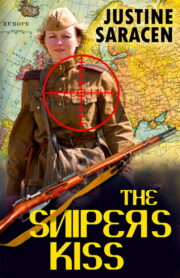Justine Saracen
THE SNIPER’S KISS
To the Soviet women who gave their lives in World War II
Acknowledgments
Historical fiction is not only the creature of imagination; it also relies on professional expertise. In this respect, I am most grateful for advice and translation (from / into Russian) from Tatiana Davydova and especially from Galina Lemelman, who maintains her own brave LGBT press in Moscow. Fellow author and lawyer Carsen Taite provided me with useful legal information, and Radclyffe, in her surgeon’s persona, assisted me in calculating how badly I could wound my heroine without killing her. I offer gratitude and affection to Shelley Thrasher, a friend, I hope, and stalwart editor, who has guided me through the shoals of prose writing for eleven novels. I acknowledge the brilliance of artist Sheri Halal, who conjured another eye-catching cover from the paint box of her mind, and the eagle-sharp eye of Stacia Seaman for final editing. Lastly, I again pay homage to Radclyffe the publisher, who built the edifice of Bold Strokes Books on the strength of her own imagination and industry. I wish I could share a bottle of wine, or three, with you all.
Prologue
Major Pavlichenko rested both elbows on the table and stared down at her wineglass. “We’re not like other soldiers. Yes, sometimes they send you off to knock out communication lines or machine-gun nests, and then you’re just a rifleman with a good aim.” She paused, turning the glass with her fingertips, and Mia knew more was coming.
“But sometimes it’s personal. You’re assigned to hunt a particular officer, or an enemy sniper, one of your professional colleagues, so to speak. Then the act of shooting is… a kind of intimacy and leaves a mark on you.”
“Intimacy? Shooting an enemy from a long distance?”
“Yes, because the target’s not anonymous anymore. You might track him for days or watch him for hours, as he moves around his subordinates. When he finally settles down and you get him in your scope, you fixate on him, on his uniform. While you’re waiting for the perfect shot, you can see his rank on his cap or collar, his medals. You study the details of his face, whether he shaved that morning or has a dueling scar. Maybe he’s handsome or looks like someone you know. You wait for him to turn just the right way, and when you lay your crosshairs over his face, you look into his eyes. He’s perhaps five hundred meters away, but he could be in your embrace, and he’s yours completely.”
She stared into space and seemed to be remembering.
“You feel a surge of power but also a little sadness because you know this man has no idea he is in the last moments of his life. How many more breaths will you allow him to take? You’re tempted to let him take another and another, because by now you’re half in love with him. But then you remember your duty and your homeland, and so, after a farewell in your thoughts, you fire. Your shot, your touch, is directly to his head. It’s a moment you never forget, and we have a name for it.”
“A name, for a kill? What’s that?”
“The sniper’s kiss.”
Chapter One
New York City, August 1942
“Patricide,” the detective said, sitting across from her at the interrogation table. He pronounced the word slowly, like something he’d never said before. “Don’t see much of that.”
Mia Kramer remained silent.
He leaned toward her, resting on his forearms. His rolled-up sleeves revealed an unpleasant amount of hair, and he gave off an odor of old sweat in spite of the fan that whirred from a shelf behind him. “The neighbors heard you fighting on the roof of the building. What were you doing up there anyhow?”
Mia sat back against her chair, seeking a maximum distance from him. “What do you think? It’s August, we live on the top floor of a tenement, and it’s like an oven inside. My father was drinking. We argued awhile, and I came downstairs again. I don’t know what happened after that.”
He slid a file toward him from the side of the table and opened it to typewritten papers stapled at one corner. He turned the pages leisurely, though obviously he’d already read them. “It says here you threatened him, that you hated him.”
“Everyone hated him. Everyone, except… that woman.” She looked away. “Wanting to do something is not the same as doing it.”
The detective read from the paper again. “‘That woman.’ You mean Agrafina Smerdjakov, otherwise known as Grushenka, the wife of Pavel Smerdjakov, the owner of the shop your father worked in. The neighbors across the alley heard the whole argument. They claim you called him a pig for screwing his boss’s wife, and in return, he said you were a pervert for doing the same thing.”
He glanced up, smirking. “I’ve always wondered how you girls do that, with no natural equipment.” He snickered. “But that must have made you pretty angry, knowing your old man was doing your girlfriend. Enough maybe to shove him off the roof.” He shook his head. “What you people get up to just amazes me. Like something out of a trashy novel.”


"The Sniper’s Kiss" отзывы
Отзывы читателей о книге "The Sniper’s Kiss". Читайте комментарии и мнения людей о произведении.
Понравилась книга? Поделитесь впечатлениями - оставьте Ваш отзыв и расскажите о книге "The Sniper’s Kiss" друзьям в соцсетях.